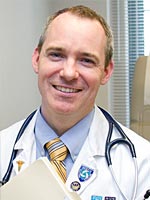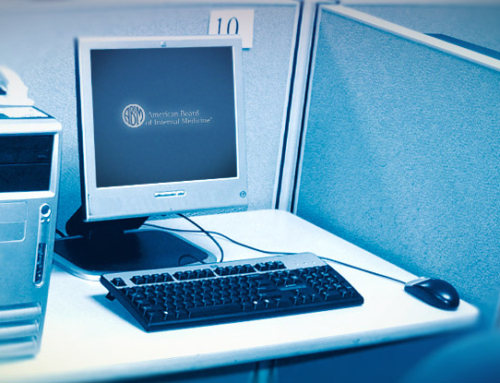 By Graham T. McMahon, MD, MMSc
By Graham T. McMahon, MD, MMSc
As I approached my first recertification for internal medicine and endocrinology, diabetes, and metabolism, some essential questions loomed in my mind: What is the real value of a recertification process for me? Should I devote the study time for the board exams and pay the money for my ABIM maintenance of certification (MOC)? And, if I do, how can I get lasting value from the process and make it both relevant and rewarding?
I know colleagues — including some very good ones — who let their board certifications lapse, and I understand the skepticism in some quarters about the MOC process. The benefit is hard to quantify, and it costs both time and money. Some physicians question the exam’s relevance to the problems we are called upon to solve each day and ask whether we’d be better off spending our educational time otherwise. And, although other professions in the U.S. require a process of recertification, most do not require an exam. For many physicians, recertification has been a rite of passage to be tolerated, and we study “just to get through it.” Indeed, while the principle of participating in board certification for our profession is easy to embrace, the process has been problematic.
But physicians have unique responsibilities in society, even among healthcare providers. When it comes to a patient’s most difficult and complex problems, we are the last recourse. With calls for increased oversight, transparency, and regulation of physicians in recent years, it’s in our profession’s interest to show that we can regulate quality ourselves.
When we are students and in training, built-in feedback from teachers and peers lets us know where we perform well and what needs improvement. But after training, our clinical practice is done mostly alone and independently. How can we know if our decisions are on par with current standards?
Why I Opted for ABIM Recertification
A certification/recertification program to measure competence encourages us to keep pace with change. Research shows that without continuous updating, a physician’s skills and knowledge tend to decline with time – and that clinicians who choose to recertify tend to perform better on standardized measures of quality and patient outcomes than clinicians who do not recertify.
The certification and recertification process establishes a blueprint for the body of knowledge we should challenge ourselves to keep fresh, sets a quality standard, and provides a publicly accountable measure for that quality. The current ABIM MOC process, with recent changes, is the avenue we currently have, designed by our peers.
I decided to take the ABIM recertification exams in both internal medicine exam and endocrinology, diabetes, and metabolism. Even though it called for a commitment of time and expense, this was my personal way of participating in the process of staying current and demonstrating my commitment to continuous self-improvement.
What I Gained from My ABIM Board Review Preparation
As I worked through the material to review for my board exams, I reviewed guidelines that were useful to my practice. I used a combination of modules from ABIM and the Endocrine Society and completed a practice audit on diabetes care. With these materials, I updated myself on new guidelines, and I reviewed cases that I see less frequently in my diabetology-focused practice but would expect myself to know. I found some elements of my practice that could be, and were, improved through the practice improvement module. Ultimately, it was good for me and good for my patients.
I’m glad I recertified. (Yes, I passed both exams.) Going through the process assured me that amidst my own busy practice — with its paperwork, phone calls, and endless distractions — I am prepared to make tricky clinical decisions and to work through and solve challenging problems. Recertification was an opportunity to check in with myself, to make sure I am positioned to make those decisions.
By saying yes to recertification and using an approach that is relevant and intellectually invigorating, we stand to gain as individual physicians, and perhaps ultimately the profession gains too.









The overlords who are making way too much money “certifying” the serfs must love these kind of propaganda articles…
I have been going through the process and I see no absolutely no value in recertification. If it wasn’t for medical malpractice concerns and the fact that I have a long practice life ahead of me, I wouldn’t bother. I don’t intend to rectify after this effort. This is nothing but busy work (especially the “practice improvement module”) and I am busy enough.
I certified in pediatrics in 1977. at that time I was certified for life, which hasn’t been rescinded. I chose not to do MOC. in 1995 I certified for adolescent medicine, which expires. I recertified once, which was a good, doable process, and I learned a lot. I chose not to recertify a third time because the process had changed. previously I went to a course, studied the syllabus, took a test and passed. now so much more work that I am not interested in is involved. I still have the same job with the same responsibilities. I still try to keep up to date with my education.
i agree with those who say it is busy work and very presumptuous to think this childish moc process trumps self-study, professionalism, reputation and the market—i will NOT recertify a 4th time though i plan decades more practice. ABIM has lost credibility.
It’s clear that a lot of physicians are finding the new MOC process to be more time consuming and burdensome. It’s not unreasonable to ask what the value of recertification/MOC is.
Since medicine is evidence based, it’s not unreasonable to ask the Board to provide data to support the benefits of MOC? Otherwise, we get endless opinions and viewpoints on the matter like the above.
As physicians, we recommend therapies and treatments based on evidence that they work, Why do we not follow the same principles for the Board MOC program? A critical examination and evaluation of the costs, benefits and workload for physicians of the MOC program is a worthwhile exercise.
NEJM should refrain from publishing people’s opinions and adhere to evidence based scientifically sound articles. The article above reveals NEJM’s bias on this issue.
This totally busy work and just another way our profession has been used and abused . Every sector of business and government feel that they can take advantage of us and financially feed off what little revenue we have left. As far as evidence base medicine it’s cook book crap. Example I treat hypertension daily in Africa American patients.Used ccb routinely because I knew that without them goal BP was not usually obtain . JNC guidelines routinely had you using other medication firstline. All of a sudden that realize that ccbs should be first line in this patient group. Guidelines are just that ,they changes and then changes back. Making physicians memorize them as if years of experience are garbage is ridiculous. ABIM is the only certifying medical group that saids after becoming certified and acquiring 10 years experience. The day after your tenths year you become incompetent and a detriment to patients unless you sit down and take 6hr exam. I may also mention your colleagues who took the test 20 -30 years before you are perfectly fine without taking that exam.
Most of the chairs of the ABIM do not participate in MOC. Even the “doctors” shoving this down our throats know that it is meaningless busywork as evinced by their non-participation.
Christine Cassel who “earned” over 8 million dollars paid by board and MOC fees to this day does not participate in MOC (Milking Our Colleagues).
Is this a paid advertisement from ABIM?
I newly moved to US, and I am still trying to understand the whole MOC process. I have done my ABIM ( internal medicine and rheumatology) and now practicing as rheumatologist.
-Do I have to participate in MOC (i.e. pay annual fee and accumulate 100 points per 5 years)?
– Do I have to redo ABIM in 10 years to keep my physician license. Is it state or job dependent?
– Can I redo my ABIM exam in 10 years, WITHOUT participating in MOC (paying annual fee, completing 100 MOC points every 5 years but completing additional fee costing activities)
I already do a lot of self learning, go to conferences, read journals and constantly keep uptodate as much as I can
If someone can clarify on those questions would be great.
While maintaining certification is not mandatory to keep your physician license in the United States, many institutions require it. Physicians who participate in MOC demonstrate to colleagues and the public their commitment to lifelong learning. Please visit the ABIM website for more details on exactly what you’d need to meet your requirements if you choose to participate (https://www.abim.org/maintenance-of-certification/moc-requirements/general.aspx).